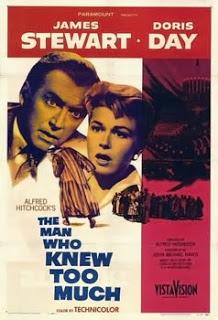
Directed By: Alfred Hitchcock
Starring: James Stewart, Doris Day, Brenda de Banzieh
Tag line: "Revenge Is The Best Medicine"
Trivia: Bernard Herrmann can be seen conducting the orchestra during the Albert Hall sequence
When discussing both the 1932 British version of The Man Who Knew Too Much and its 1956 American remake, Alfred Hitchcock (who directed them both) called the first movie the work of a “gifted amateur”, while the second was made by “a professional”. And as much as I love the original, there’s no denying the latter film is the better of the two.
As the movie opens, Dr. Ben McKenna (James Stewart) and his wife Jo (Doris Day), along with their son Hank (Christopher Olsen), are enjoying a family vacation in Morocco. The fun and frivolity ends abruptly, however, when Louis Bernard (Daniel Gélin), who they had recently befriended, is stabbed to death in a marketplace in Marrakesh. Before dying, Bernard tells Ben about a plot to assassinate a foreign diplomat based in London. But before Ben can pass this on to the police, he learns that Hank has been kidnapped by the very people who killed Louis Bernard, and that, if he wants to see his son again, he’d better keep his mouth shut. In desperation, the McKennas head to London, where they do everything in their power to locate Hank and, if possible, stop the assassination.
Whereas the 1934 film is more compact, squeezing its tale of intrigue into a brisk 75 minutes, the remake (clocking in at 2 hours) features wonderful performances by James Stewart and Doris Day, playing worried parents drawn into the middle of something they don’t fully understand. Day, whose character gave up a show-biz career to become a full-time housewife and mother, even gets to belt out a tune, singing the now-classic Que Sera Sera (which took home that year’s Academy Award for Best Song). The remake also features a number of excellent sequences, chief among them the showdown in the Royal Albert Hall. While the 1934 movie rushed through this scene (though, in truth, it was still effective), the ’56 version lingers there a bit longer, favoring imagery over dialog as it builds the suspense to an almost fever pitch. In the original, the Albert Hall sequence was an exciting aside; here, it’s a tense, emotionally draining experience.
1934’s The Man Who Knew Too Much will always hold a special place in my heart; aside from being one of the very first Hitchcock films I ever saw, it shows the director at the beginning of his career, delving into a genre he would dominate for decades to come. But if I was forced to choose between the two, the remake would win out every time.
